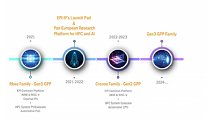Wednesday, June 5th 2019
The EPI Announces Successful First Steps Towards a Made-in-Europe High-performance Microprocessor
The European Processor Initiative(EPI), crucial element of the European exascale strategy, delivers its first architectural design to the European Commission and welcomes new partners Almost six months in, the project that kicked off last December has already delivered its first architectural designs to the European Commission, thus marking initial milestones successfully executed. The project that will be the cornerstone of the EU's strategic plans in HPC initially brought together 23 partners from 10 European countries, but has now welcomed three more strong additions to its EPI family. EPI consortium aims to bring a low-power microprocessor to the market and ensure that the key competences for high-end chip design remain in Europe. The European Union's Horizon 2020 program funds this project with a special Framework Partnership Agreement. The initial stage is a three-year Specific Grant Agreement, which lasts until November 2021.The EPI consortium includes experts in all the relevant areas for such a major undertaking: the High-Performance Computing research community, major supercomputing centers, the computer system, automotive, and silicon industry, as well as the potential scientific and industrial users. Through a co-design approach, EPI will design and develop the first European HPC System for the HPC and automotive markets through several major streams of operation:
Thanks to such new European-developed technologies, European researchers from academia and industry will be able to access HPC systems at exceptional levels of energy-efficient performance. As recognized by high-level EU officials, EPI will contribute to Europe's scientific leadership, industrial competitiveness, engineering skills and know-how - not to mention society as a whole."European Processor Initiative will deliver key technologies to the new European HPC strategic plan for an independent and innovative European high-performance computing and data ecosystem. Energy efficient high-performance families of EPI processors will include most advanced general-purpose and accelerator cores that will deliver unprecedented processing capabilities, enabling EU researchers from academia and industry to most efficiently address global challenges. The business sustainability of the initiative is supported by carefully balanced target markets, with primary focus on exascale HPC/AI and automotive markets," said Jean-Marc Denis, EPI Chairman of the Board.
"It is a privilege to lead this consortium and enable the creation of a new big player in the field of advanced semiconductors in Europe. We have the best teams, and a huge portfolio of expertise on board from deep node submicron, co-Design, computer science, to HPC, and automotive end-products. We expect to ship from 2021 our 1st high class and high-performance solution,"said Philippe Notton, General Manager of EPI.
"Acceleration is crucial to continued performance gains while reducing power consumption in computing. In EPI, the first accelerator will begin from RISC-V technology to deliver two unique vector and artificial intelligence accelerators for HPC and AI, since future supercomputers will be mostly heterogeneous; the second accelerator, based on Kalray's IP, will lead the path to deterministic automotive computation. Both are offering a European solution to future global converged (HPC and AI) computing needs," said Professor Mateo Valero, Director of Barcelona Supercomputing Center.
"The combination of general-purpose processors, hardware accelerators, security modules, and further IP modules on a system-on-chip is one of the key success factors for realizing a high-performant and energy-efficient automotive computing platform forautonomous driving and connected mobility", said Matthias Traub, manager of electric/electronic architecture at BMW Group Research.
EPI will use a holistic approach to refine the system architecture and its component specifications. All aspects of the solution, and their interactions, will be considered and tackled simultaneously, taking a co-design approach:
EPI plans to deliver two generations of processorfamilies,with future families to follow. The architectural design of EPI processor families will ensure thatindividual processors address requirements specific toa particular market segment.
Source:
EPI
- HPC general purpose processor
- Accelerator
- Automotive platform
Thanks to such new European-developed technologies, European researchers from academia and industry will be able to access HPC systems at exceptional levels of energy-efficient performance. As recognized by high-level EU officials, EPI will contribute to Europe's scientific leadership, industrial competitiveness, engineering skills and know-how - not to mention society as a whole."European Processor Initiative will deliver key technologies to the new European HPC strategic plan for an independent and innovative European high-performance computing and data ecosystem. Energy efficient high-performance families of EPI processors will include most advanced general-purpose and accelerator cores that will deliver unprecedented processing capabilities, enabling EU researchers from academia and industry to most efficiently address global challenges. The business sustainability of the initiative is supported by carefully balanced target markets, with primary focus on exascale HPC/AI and automotive markets," said Jean-Marc Denis, EPI Chairman of the Board.
"It is a privilege to lead this consortium and enable the creation of a new big player in the field of advanced semiconductors in Europe. We have the best teams, and a huge portfolio of expertise on board from deep node submicron, co-Design, computer science, to HPC, and automotive end-products. We expect to ship from 2021 our 1st high class and high-performance solution,"said Philippe Notton, General Manager of EPI.
"Acceleration is crucial to continued performance gains while reducing power consumption in computing. In EPI, the first accelerator will begin from RISC-V technology to deliver two unique vector and artificial intelligence accelerators for HPC and AI, since future supercomputers will be mostly heterogeneous; the second accelerator, based on Kalray's IP, will lead the path to deterministic automotive computation. Both are offering a European solution to future global converged (HPC and AI) computing needs," said Professor Mateo Valero, Director of Barcelona Supercomputing Center.
"The combination of general-purpose processors, hardware accelerators, security modules, and further IP modules on a system-on-chip is one of the key success factors for realizing a high-performant and energy-efficient automotive computing platform forautonomous driving and connected mobility", said Matthias Traub, manager of electric/electronic architecture at BMW Group Research.
EPI will use a holistic approach to refine the system architecture and its component specifications. All aspects of the solution, and their interactions, will be considered and tackled simultaneously, taking a co-design approach:
- hardware platform architecture and components
- system and runtime software (OS, middleware, developers kit, compilers and libraries, etc.)
- HPC end-user applications
- developing low-power microprocessor technology to be tentatively included in a European pre-exascale and subsequently exascale systems
- guaranteeing that a significant part of that technology is European
- ensuring that the application areas of the technology are not limited only to HPC, but cover other areas such as the automotive sector and the data centers, thus ensuring the overall economic viability of the initiative.
EPI plans to deliver two generations of processorfamilies,with future families to follow. The architectural design of EPI processor families will ensure thatindividual processors address requirements specific toa particular market segment.


23 Comments on The EPI Announces Successful First Steps Towards a Made-in-Europe High-performance Microprocessor
So they want to fail at making CPUs that work beyond ARM click to add build a CPU? When is the last time something great came out of a beauocratic committee?
This "initiative" stinks so much Soviet-Union it makes one puke.In 1954 CERN was the fruit of a group of nations. This is the EU now, the Commission (read Politburo)
I've waited in enough soviet bread lines to have a very good idea of what the performance will be like.
Well, but it's nice if they can pull it off, more competition = GOOD.
But this is probably oriented for professional market, so I doubt we'll see home use PC's Made in Europe anytime soon.
That said, way off topic.To a degree, maybe. But it's also partially true (not the americans can't design part, not touching that). The world is increasingly pursuing alternative CPU designs precisely because of American isolationism. Programs existed before the latest administration yes, but the behavior of America as of late has only put them at the forefront of news and budgets, essentially supercharging them.
Seriously, though, it seems reasonable to assume that consumers cannot have access to top-tier security. I have read somewhere that the strongest encryption is not legal for "ordinary" citizens to use and that they cannot own body armor. More broadly, they have less access to money, including the inability to function on a physical level that can compete with an entity like a corporation or government.
They can't stop us from using our brains, yet. Not directly and en masse anyway.
global.handelsblatt.com/politics/trump-may-point-eu-tariffs-ifo-says-899083
“The EU is by no means the paradise for free traders that it likes to think,” said Gabriel Felbermayr, director of the ifo Center for International Economics, a division of the Munich-based ifo Institute. The European Union actually comes off as the bigger offender when compared to the US, he added. The unweighted average EU customs duty is 5.2 percent, versus the US rate of 3.5 percent, according to ifo’s database.
So when Mr. Trump complains of “massive tariffs” he is not that far off the mark in several cases. And he does complain. “If the EU wants to further increase their already massive tariffs and barriers on US companies doing business there, we will simply apply a tax on their cars, which freely pour into the US,” the president tweeted earlier this month. “They make it impossible for our cars (and more) to sell there. Big trade imbalance!”
....
In fact it wasn’t even Mr. Trump who first broke off negotiations over a US-EU free trade deal known as the Transatlantic Trade and Investment Partnership (TTIP), the German economist noted. It was actually the EU that put the unpopular talks “on ice” ahead of elections in France and Germany.
I of course, am talking about real proof. Conceptual or even mathematical, but we both know you can't give such one.
Keep your off topic spats/arguing in PMs.
Don't Troll or Bait as a distraction from the topic.
Be civil and carry on.
Thank You
I hope it brings a more versatile CPU world to us all.
I applaud their attempt, but it's going to either end up a one trick pony, or a donkey show where the woman is the EU paying for a committee designed product being shoved places.